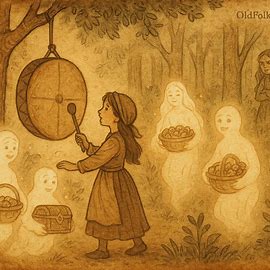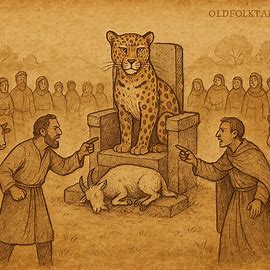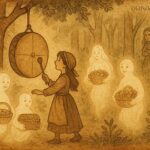Chipila and Zongwe were more than just neighbours; they were brothers in spirit. Their huts stood side by side, their farms shared a boundary, and their lives intertwined through hard work and companionship. They tilled, sowed, and harvested together, earning the nickname “Twin Gods” from villagers who admired their unity. Yet, beneath this harmony lay the seeds of a story that would reveal the dangers of greed.
One sweltering afternoon, while the two friends worked on Zongwe’s farm, Zongwe suddenly grew faint. The heat pressed down heavily, and soon he collapsed. Alarmed, Chipila carried him into his hut and called the elders to care for him. Assured that Zongwe’s condition was not serious, Chipila returned to the field, determined not to waste time.
As he tilled, his hoe struck something unusual. The ground gave off a hollow sound. Digging deeper, he uncovered a rotting wooden plank and, beneath it, a hidden ditch with smooth walls. Inside lay four carefully sealed gourds. Curiosity burned within him. At first, Chipila reasoned that they might contain sugarcane liquor hidden long ago by Zongwe’s ancestors. Still, temptation overcame caution. One by one, he unsealed the gourds.
The first gourd overflowed with cowries, precious shells that symbolized wealth. His heart leapt. The second and third gourds held the same glittering treasure. By now, his joy swelled into disbelief. Surely this meant Zongwe descended from a great and wealthy family! His first impulse was to run and tell his friend. But then a darker thought crept in.
READ: How the Monkeys Came to Be: A Zambian Folktale
“Why should I tell Zongwe? I found them. The finder is the keeper.”
His hands trembled with excitement as he opened the fourth gourd. But his joy soured, the vessel was only half full. Instead of gratitude for three gourds brimming with wealth, Chipila’s mind fixated on the incomplete one. Dissatisfied, he carried all four gourds to a cave, concealed them, and carefully covered the ditch with soil.
That evening, Chipila returned to Zongwe’s side, pretending deep concern. He reassured his friend about the farmwork but never breathed a word of the treasure. Yet, the half-filled gourd haunted him. Night after night, he obsessed over it.
Soon, Chipila began hoarding every cowrie he earned, pouring them into the gourd. But strangely, it never filled. The shells vanished into its depths, always leaving it half empty. He sold his animals, clothes, and cooking pots, trading them for more cowries. Still the level barely rose. Desperate, he sold his hut, his spear, even his ancestral land.
The elders warned him. “Greed will destroy you, Chipila. Be content.”
But he ignored their wisdom. His once gentle nature hardened into bitterness. He cheated, fought, and gambled, consumed by the gourd’s hunger. His friendship with Zongwe decayed, though Zongwe, kind as ever, sheltered and fed him.
One day, Zongwe harvested his crops and traded part of his yield for a bag of cowries. The sight of it made Chipila’s obsession boil over. That night, while Zongwe slept, Chipila crept into his hut, stole the bag, and fled to the cave.
With shaking hands, he poured the cowries into the cursed gourd. At last, it filled to the brim and spilled over! His laughter echoed wildly through the cave.
“I have done it! I have done it!” he cried, giddy with triumph.
But another voice echoed his laughter. “Hee hee hee, ha ha ha!”
Chipila froze. Before him stood a grotesque spirit, the shade of a long-dead ancestor. Its face twisted in a ghastly smile.
“My son,” the spirit croaked, “you have fulfilled my wish. For years, I waited for someone to fill the fourth gourd. Now my desire is complete, thanks to your greed!”
With a mocking laugh, the spirit vanished into the air, taking all four gourds with it. Chipila was left with nothing, no wealth, no land, no friend. Only emptiness remained where greed had devoured his soul.
Moral Lesson
This tale reminds us that greed blinds the heart to gratitude. Chipila possessed enough wealth to live in abundance, yet his obsession with the half-filled gourd consumed him. Instead of cherishing three gourds full of riches, he sacrificed his integrity, friendship, and peace of mind for the illusion of completeness.
True wealth lies not in the endless pursuit of more but in contentment with what one has. Gratitude preserves relationships and brings peace, while greed destroys everything in its path.
Knowledge Check
Q1: Who were Chipila and Zongwe, and why were they called the “Twin Gods”?
A1: They were close friends and neighbours who worked side by side in all farming tasks, earning the nickname “Twin Gods” for their unity.
Q2: What did Chipila discover while tilling Zongwe’s land?
A2: He uncovered a hidden ditch containing four gourds, three filled with cowries and one half full.
Q3: Why did Chipila become obsessed with the fourth gourd?
A3: Despite already having three full gourds, greed consumed him, and he fixated on filling the half-empty one.
Q4: How did Chipila’s behaviour change because of his greed?
A4: He sold his belongings, cheated, fought, gambled, and even betrayed Zongwe, becoming bitter and unfriendly.
Q5: What happened when Chipila finally filled the fourth gourd?
A5: An evil ancestral spirit appeared, claimed the gourds, and vanished, leaving Chipila with nothing.
Q6: What key lesson does this Zambian folktale teach?
A6: It teaches that greed blinds people to true blessings and ultimately leads to loss and ruin.
Folktale Origin
Source: Kalulu the Hare and Other Zambian Folk-Tales, Bemba folktale, Zambia.







